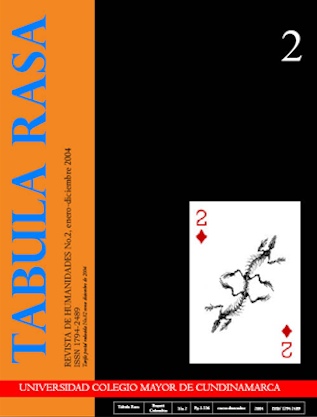Building counterpowers to the new geoeconomic wars: Paths towards a globalization of resistance
Construyendo contrapoderes a las nuevas guerras geo-económicas: Caminos hacia una globalización de la resistencia
Show authors biography
We are at a crucial historical moment for the redefinition of political, economic and social relations, characterized by increasing polarizations and the establishment of a single superpower with changing allies. Within this scenario, war as a tool and intervention to open new fields to specific economic interests has acquired an important role. I will argue in this article that there is a qualitative shift in contemporary wars toward new "geo-economic wars" that frequently involve extra-state actors. As these phenomena have acquired a global dimension, they can no longer be solved solely at the regional or national level. Faced with these political and economic processes of aggressive globalization, there is a need to also create the globalization of resistance, solidarity, justice, and peace.
I will contextualize this debate with the examples of 1) the mobilizations that took place in Great Britain against the most recent war in Iraq, and 2) the forms of resistance of black communities in the Colombian Pacific region against the war that It has been unleashed in recent years in this region. I therefore propose to examine two examples of localized resistance that are simultaneously inscribed in a global movement against the new geo-economic wars.
Article visits 85 | PDF visits 53
Downloads
Archila, Mauricio. 2003. Idas y venidas, vueltas y revueltas: protestas sociales en Colombia (1958- 1990). ICANH/CINEP, Bogotá.
Arocha, Jaime. 1999. Ombligados de Ananse: hilos ancestrales y modernos en el Pacífico colombiano, CES, Bogotá.
__________. 1992. «Los negros y la nueva Constitución colombiana de 1991», En América Negra. 3:39-54.
Beck, Ulrich. 1998. Perspektiven der Weltgesellschaft, Suhrkamp, Frankfurt am Main.
Castells, Manuel. 1996. The rise of the network society. Blackwell, Oxford.
Cohen, Jean. 1985. «Strategy or identity: new theoretical paradigms and contemporary social movements». En Social Research. 52:663-716.
Córdoba, Marino. 2001. «Trágico amanecer». En Éxodo, patrimonio e identidad. Segura, M. (ed).
1-12. Memorias de la V. Cátedra Anual de Historia «Ernesto Restrepo Tirado», 29.Nov.-
1.Dic. 2000, Ministerio de Cultura, Bogotá.
El Tiempo. 2002. «Manual para días de guerra en el Baudó», Domingo 10 Febrero 2002.
Escobar, Arturo. 1996. «Constructing nature: elements for a poststructural political ecology».
En Liberation ecologies: environment, development and social movements. Peet, R. & Watts. M. (eds).
46-68. Routledge, London.
Escobar, Arturo & Sonia Alvarez (1992), «Introduction: theory and protest in Latin America today». En The making of social movements in Latin America: identity, strategy, and democracy.
Escobar, A. & Alvarez, S. (eds). 1-15. Westview Press, Oxford.
Grueso, Libia; Carlos Rosero & Arturo Escobar. 1998. «The Process of Black Community organizing in the southern Pacific coast region of Colombia». En Cultures of politics, politics of cultures: re-visioning Latin American social movements. Alvarez, S., Dagnino, E. & A. Escobar (eds). 196-219. Westview Press, Oxford.
Grueso, Libia & Leyla Arroyo. 2002. «Women and the defence of place in Colombian black movement struggles». En Development 45(1):60-67.
Hardt, Michael & Antonio Negri. 2000. Empire. Harvard University Press, London.
Harvey, David. 1989. The condition of postmodernity, Blackwell, Oxford.
Henao, Diego. 2003. «Extraños, nómadas y confinados». En Asuntos Indígenas 4/03:20-27 (Copenhagen: International Work Group for Indigenous Affairs: www.iwgia.org) [también disponible en: www.codhes.org.co/dreportajem.php?informe=6&report=8]
Hobsbawm, Eric. 1995. Age of extremes: the short twentieth century 1914-1991. Abacus, London.
Journal of Latin American Anthropology. 2002. Número especial: Black identity and social movements in Latin America. The Colombian Pacific region, 7(2).
Klein, Naomi. 2001. «Reclaiming the commons». En New Left Review. 9:81-89.
Laclau, Ernesto. 1985. «New Social Movements and the plurality of the social». En New social movements and the state in Latin America. Slater, D. (ed). 27-42. CEDLA, Amsterdam.
Laclau, Ernesto & Chantal Mouffe. 1985. Hegemony & socialist strategy: towards a radical democratic politics. Verso, London.
Leal Buitrago, Francisco y León Zamosc (eds). 1991. Al filo del caos: crisis política en la Colombia de los años 80. Tercer Mundo Editores, Bogotá.
Lefebvre, Henri (1976), «Reflections on the politics of space». En Antipode, 8(2):30-37. Nogué, Joan & Joan Vicente. 2001. Geopolítica, identidad y globalización. Ariel, Barcelona.
ONU (Organización de Naciones Unidas). 2002. «Informe de la Oficina en Colombia del Alto Comisionado de las Naciones Unidas para los Derechos Humanos sobre su Misión de Observación en el Medio Atrato». 20 de Mayo de 2002.




